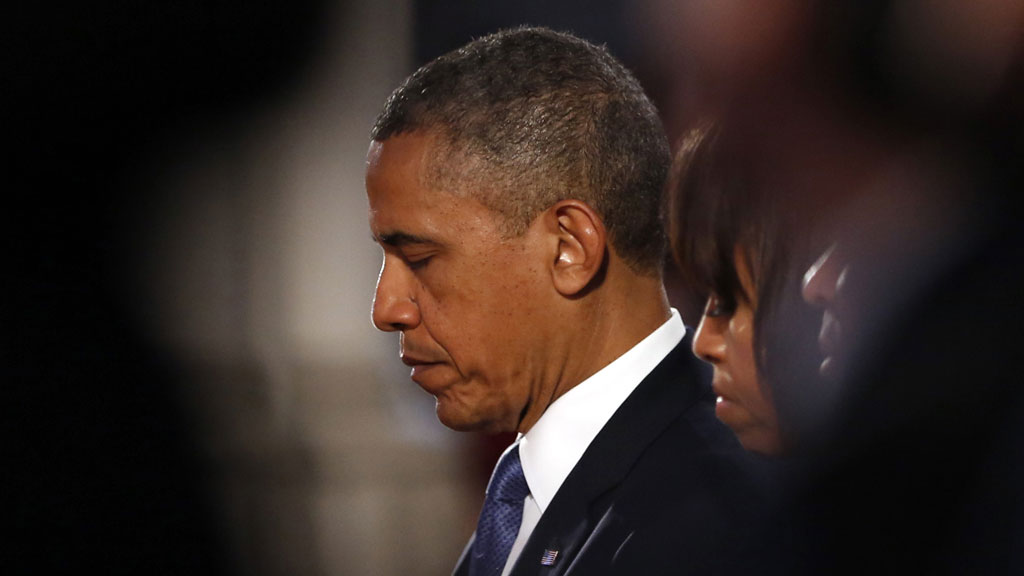Boston bombing: fear, loathing and the enemy within
It has become the defining theme of the Obama presidency: how to protect a nation in an age of terror? But in the wake of the Boston bombs – is the homegrown threat now a fact of life?

Obama was never meant to be a wartime president, yet the struggle against terrorism, at home and abroad, has overshadowed almost every part of his administration’s policy.
This second term was supposed to be all about the legacy: building a new image for America in the world, reviving the economy, tackling fundamental issues like immigration.
Obama hailed the end of military engagement in Iraq and Afghanistan. Bin Laden was dead, a series of bomb plots were foiled. But weeks after his re-election came the Newtown massacre, and with it, a sudden urgency to tackle gun crime.
And then Boston: and a new atrocity to explode across the national consciousness. Ari Fleischer, former press secretary to President George W Bush, told Politico: “He doesn’t want this to be the conversation, he doesn’t want to lean into it emotionally like (we) did, That will have to change now, obviously.”
A new study by Pew Research shows most Americans are resigned to the terror threat. Some three-quarters believe that “occasional acts of terror” are simply a fact of life, although knowing this, they are no more scared.
Terrorist or boy-next-door
A majority think the government has done more to make the country safer since 9/11, although they remain evenly divided over whether the authorities can do more to protect them, faced with a threat that defies all the usual parameters.
As Politico points out, Britain’s response after the 7/7 London bombings was very different: “national soul searching and an overhaul of the UK’s anti-terror and surveillance strategies, sparking a wave of attacks on mosques and finger-pointing among officials who missed signs of the plot.”
So what of the United States, post-Boston? The young bombers who also “blurred the lines between terrorist and boy next door”?
There has certainly been no shortage of finger-pointing: senior FBI officials will be questioned by senators this week to find out if they missed any danger signals surrounding Tamerlan Tsarnaev. Republican Lindsey Graham has already accused the agency of “dropping the ball”.
But it was difficult enough tackling the inchoate, fragmented nature of the overseas terror threat. The homegrown one is even harder to penetrate.
In fact, those who have studied the nature of terrorist plots have discovered the vast majority are cooked up by one or more individuals, not directed by some multinational organisation.
They belong to loose, homegrown networks of family and friends who die not just for a cause, but for each other. Scott Atran, University of Michigan
According to Scott Atran, author of several studies into the terror threat: “Our findings indicate that terrorist plotters against western civilian populations tend not to be part of sophisticated, foreign-based command-and-control operations.”
“Rather, they belong to loose, homegrown networks of family and friends who die not just for a cause, but for each other.”
Latest details from the interrogation of the surviving bomb suspect Dzhokhar Tsarnaev suggest his radicalism originated entirely at home: sources told the Washington Post he was motivated by the wars in Iraq and Afghanistan, but was not influenced by any foreign organisation.
One official tells the paper: “These are persons operating inside the United States without a nexus,” – informed, and informing others via the internet. It is what Atran calls the “dark side of globalisation” spurred by the way that (mis)information can be spread around the world, in an instant.
Yet the response to these varied and continued threats has itself been criticised for whipping up a needless mass hysteria among a people constantly searching for the next update, the next headline.
Dark side of globalisation
The explosions in Boston were minutes apart, yet they plunged one of America’s biggest and busiest cities into almost total lockdown for many hours. A global security alert was issued via Interpol, covering 190 countries.
Surveillance, searches, travel restrictions, background checks: all of these have become a fact of life, along with those “occasional acts of terror” which defy even the tightest security.
This, from Foreign Policy: “We can never, ever be absolutely safe, no matter how much treasure we spend, or civil liberties we sacrifice.” But life has always been about the negotiation of a myriad everyday risks. As Pew has discovered, the terror threat is now just one of them.
After 11 September the narrative was driven by a new imperative: homeland security. Yet New York carried on, normalised by its sense of resilience. Look around the streets of Boston this week and there is evidence of that same spirit.
We’re not living in fear. Asa Hutchinson, former undersecretary for homeland security
Buses are adorned with the slogan “Boston strong”. Sales of American flags have soared in a nation finding common cause in the wake of one city’s tragedy. Barely anyone says they will change anything about the way they lead their lives.
“We didn’t go to orange alert this week, we didn’t shut down the airports, we didn’t call out the National Guard across the country,” said former under-secretary of homeland security, Asa Hutchinson. “We’re not living in fear.”
It was the message which President Obama proclaimed at the memorial service for the Boston victims earlier this week, when he declared: “We may be momentarily knocked off our feet. But we’ll pick ourselves up. We’ll keep going. We will finish the race.”
America in the age of terror. Home of the brave, then – and trying, at least, to remain the land of the free.
Felicity Spector writes about US politics for Channel 4 News